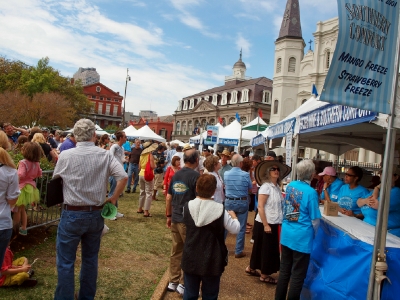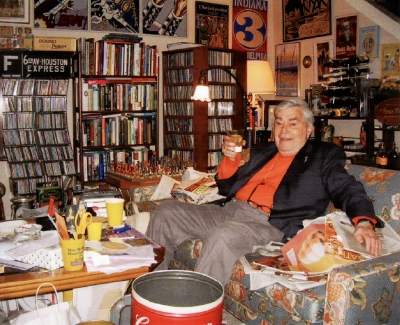
Saturday, April 10. French Quarter Festival. Remembrance For A Mentor. Out the door at eight-thirty, headed to the French Quarter Festival. I host a live radio show from the event every year. The only one I've missed since I took that baton from Chef Buster Ambrosia was last year's. I didn't notice, when we planned our transatlantic crossing on the Queen Mary 2, that it would pre-empt the FQF broadcast.
I went on the air in the downtown-lake corner of Jackson Square at ten--two hours earlier than my usual Saturday time. With me was "Pal" Al Nasser, who has co-hosted this and similar shows with me for years. (Mary Ann told me later that she thinks we're a good team, and if she says so. . . ) The weather could not have been better. We began with a buttermilk sky, followed later by a mackerel sky--both made from a layer of puffy little clouds. It was just warm. Not hot yet. A little breeze blew. It was like this yesterday and would be tomorrow, and as a result the Festival broke all kinds of records by a long margin. (Half a million people came through in the three days, they said later.)
The French Quarter Festival radio program neither gets nor needs calls from listeners. A nonstop parade of food vendors visits my table, and we talk. I like the long-winded ones, who give me a chance to actually taste the food samples they bring. The most entertaining was, as usual, Tommy Wong from Trey Yuen. Because they had a restaurant across from Jackson Square in the 1980s, the Wong brothers have been a part of the FQF since the first one in 1984. As we do every year, we delved into the reason why crawfish in lobster sauce has not a single DNA molecule from a lobster in it. (It's crawfish in a sauce originally devised for lobster.)
 Vance Vaucresson came by with his incomparable Creole hot sausage, the standard of the business. He sells it in a poor boy at the Festival. Rick Gratia from Muriel's brought a plate of his signature crawfish and goat cheese crepes. His kiosk had the longest line when the gates opened, and still was as busy as any. The folks from Mrs. Wheat's meat pies brought a couple of those. The filling is the same as it's always been, but since the hurricane they seem to have lost the secret of the pastry part of it. Too soft, too oily. Flour Power--one of the very first food service operations to return to business in Chalmette after Katrina--came by with a box of beautiful pastries. They said they'd closed the Chalmette shop, and were moving elsewhere while still making their pastries for restaurants.
Vance Vaucresson came by with his incomparable Creole hot sausage, the standard of the business. He sells it in a poor boy at the Festival. Rick Gratia from Muriel's brought a plate of his signature crawfish and goat cheese crepes. His kiosk had the longest line when the gates opened, and still was as busy as any. The folks from Mrs. Wheat's meat pies brought a couple of those. The filling is the same as it's always been, but since the hurricane they seem to have lost the secret of the pastry part of it. Too soft, too oily. Flour Power--one of the very first food service operations to return to business in Chalmette after Katrina--came by with a box of beautiful pastries. They said they'd closed the Chalmette shop, and were moving elsewhere while still making their pastries for restaurants.
My original plan was to swing by Antoine's Annex after the show ended at one. But I had no appetite left after all the samples I scarfed. Drove to the radio station and spent the next few hours catching up on a lot of writing and producing a couple of commercials. Then conked out for a half-hour nap on the floor of my studio, where nobody would bother me. (I wish we had a sofa. I wish even more I had an apartment in town.)
I didn't go home because I had another appointment on the South Shore. Michael Ledet and Pat Brady hosted a memorial gathering for Richard Collin at Pat's place. Michael was a long-time friend of Collin, an is the executor of his estate, most of which consists of a dizzying collection of books and memorabilia. The estate also includes the rights to Collin's half-dozen books, among which is The New Orleans Cookbook. It's in the running to be considered the best of its kind.
The two dozen people who turned up included a mix of close and not-so-close friends. No relatives, though. Collin, I learned tonight for the first time, was the son of an immigrant from England. That explains why his closest kin are two superannuated cousins in England. Collin's wife Rima died over a decade ago. They had no children. After that, his closest companion was Phyllis Mayronne, who met Collin on a European trip. Phyllis had also lost her spouse, Harry Mayronne, Sr.--an advertising man I knew very well. Neither Dick nor Phyllis were looking to remarry, but they clicked immediately. For the next ten years, Phyllis said, they had a nonstop conversation about all the things they loved--not the least of which were their lost spouses.

Richard Collin at home in his last days. His office at UNO also looked like this.
Dick Collin (as his friends called him) was a man of so many strongly held and individualistic ideas that people either loved him or. . . well, let's just say didn't love him. But even those who weren't his fans agree that his effect on the New Orleans restaurant scene was deep, dramatic, and long-lasting. Collin was the New Orleans Underground Gourmet, the city's first real restaurant critic. He opened the eyes even of lifelong New Orleanians to many unknown riches in our local cuisine. He was mad about New Orleans and its food, and expressed his feelings so strongly that it couldn't help but jazz one's palate and mind. As Errol Laborde pointed out, he even left us with a new word in our local vocabulary for a perfect dish: platonic.
Errol, dressed in a tuxedo (he had another engagement later), was the first of many people who shared recollections, appreciations, anecdotes and quotations of Collin. They illustrated Collin's lifelong quest for hedonism--to use the words he said the last time I saw him alive. It was no academic pose, but an honest obsession to his dying day.
When it was my turn, my feelings about Collin were easy to describe in a few words. "If I had never encountered Richard Collin and his work, I would not be the person I am," I said, "and I would not be doing the things I do." I took three of his history courses at UNO, where he was a well-liked professor. But I didn't know him personally all that well. What I did know, well enough to quote it accurately, is The New Orleans Underground Gourmet. That book gave direction to my life, and made Collin my most important mentor. That's why I have the better part of a chapter in Hungry Town about him.
There was food and drink at the party, of course. And lots of good stories. Solemnity would have Dick Collin barking at us from the dead that we should drink up and get some life into this party. So we ate, drank, and laughed.